Related Research Articles
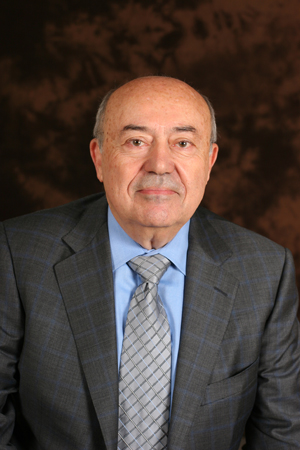
Andrew James Viterbi is an Italian Jewish–American electrical engineer and businessman who co-founded Qualcomm Inc. and invented the Viterbi algorithm. He is the Presidential Chair Professor of Electrical Engineering at the University of Southern California's Viterbi School of Engineering, which was named in his honor in 2004 in recognition of his $52 million gift.
Irving Stoy Reed was an American mathematician and engineer. He is best known for co-inventing a class of algebraic error-correcting and error-detecting codes known as Reed–Solomon codes in collaboration with Gustave Solomon. He also co-invented the Reed–Muller code.
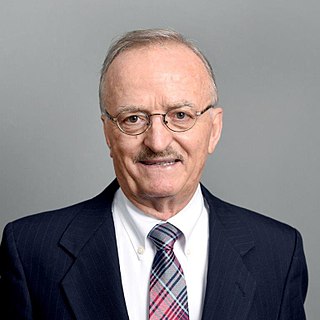
Constantine A. Balanis is a Greek-born American scientist, educator, author, and Regents Professor at Arizona State University. Born in Trikala, Greece on October 29, 1938. He is best known for his books in the fields of engineering electromagnetics and antenna theory. He emigrated to the United States in 1955, where he studied electrical engineering. He received United States citizenship in 1960.
John G. Webster was an American electrical engineer and a founding pioneer in the field of biomedical engineering. In 2008, Professor Webster was awarded the University of Wisconsin, College of Engineering, Polygon Engineering Council Outstanding Instructor Award. In 2019, the Institute of Electrical and Electronics Engineers awarded him its James H. Mulligan Jr. Educational Medal for his career contributions. Professor Webster died on March 29, 2023.
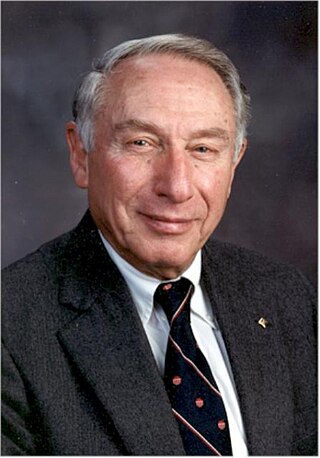
Floyd Dunn was an American electrical engineer who made contributions to all aspects of the interaction of ultrasound and biological media. Dunn was a member of Scientific Committee 66 of the National Council on Radiation Protection and Measurements as well as many FDA, NIH, AIUM, and ASA committees. He collaborated with scientists in the UK, Japan, China and Post-Soviet states.

Scott E. Fraser is an American biophysicist and Provost Professor of Biological Sciences and Biomedical Engineering at the University of Southern California (USC). He is also the Elizabeth Garrett Chair in Convergent Bioscience and Director of Science Initiatives, where he is helping to launch USC’s Initiative in Convergent Bioscience. In addition, he holds joint appointments in the Departments of Physiology and Biophysics, Stem Cell Biology and Regenerative Medicine, Pediatrics, Radiology, and Ophthalmology.

Yannis C. Yortsos is a Greek-American chemical engineer and academic, currently serving as Dean of the Viterbi School of Engineering at the University of Southern California.

The John and Marcia Price College of Engineering at the University of Utah is an academic college of the University of Utah in Salt Lake City, Utah. The college offers undergraduate and graduate degrees in engineering and computer science.

IEEE Antennas and Wireless Propagation Letters is a peer-reviewed scientific journal with the goal of rapid dissemination of short manuscripts in the antennas and wireless propagation domains. It is an official journal of the IEEE Antennas & Propagation Society. The current editor-in-chief is Steven Gao.
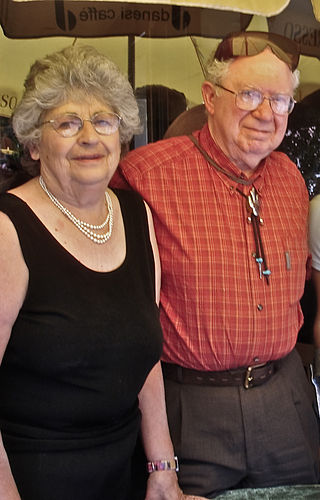
Thelma Estrin was an American computer scientist and engineer who did pioneering work in the fields of expert systems and biomedical engineering. Estrin was one of the first to apply computer technology to healthcare and medical research. In 1954, Estrin helped to design the Weizmann Automatic Computer, or WEIZAC, the first computer in Israel and the Middle East, a moment marked as an IEEE Milestone in Electrical and Computer Engineering. She was professor emerita in the Department of Computer Science, University of California at Los Angeles (UCLA).
Olga Boric-Lubecke is a Professor of electrical engineering at the University of Hawaiʻi at Mānoa. She was named Fellow of the Institute of Electrical and Electronics Engineers (IEEE) in 2015 for "contributions to biomedical microwave technology". She co-founded Adnoviv a startup working with sensor technology founded in 2013 with her colleague Victor Lubecke.
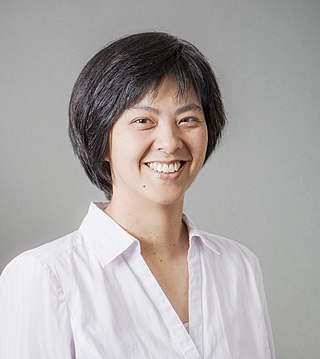
Ellis Meng is the Shelly and Ofer Nemirovsky Chair of Convergent Biosciences and Professor of Biomedical Engineering and Electrical and Computer Engineering in the Viterbi School of Engineering at the University of Southern California, where she also serves as the Vice Dean of Technology Innovation and Entrepreneurship. Meng is highly decorated in the development of novel micro- and nanotechnologies for biomedical applications. In 2009, Meng was named on MIT Technology Review's "Innovators Under 35" List for her work on micropumps that deliver drugs preventing blindness, and she was listed on the 40 Under 40 List of the Medical Device and Diagnostic Industry (MDDI) in 2012.
Nan Marie Jokerst is an American professor of Electrical and Computer Engineering at Duke University known for her work integrating optoelectronics with semiconductor substrates in order to create portable environmental and medical sensors. She is a Fellow of the Optical Society and Fellow of the Institute of Electrical and Electronics Engineers.
Mahta Moghaddam is an Iranian-American electrical and computer engineer and William M. Hogue Professor of Electrical Engineering in the Ming Hsieh Department of Electrical and Computer Engineering at the University of Southern California Viterbi School of Engineering. Moghaddam is also the president of the IEEE Antennas and Propagation Society and is known for developing sensor systems and algorithms for high-resolution characterization of the environment to quantify the effects of climate change. She also has developed innovative tools using microwave technology to visualize biological structures and target them in real-time with high-power focused microwave ablation.
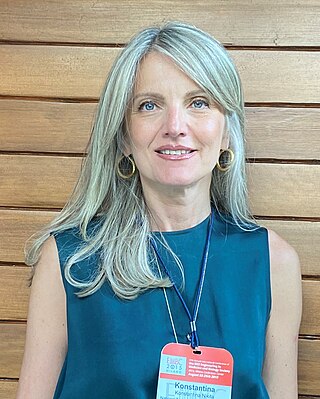
Konstantina "Nantia" Nikita is a Greek electrical and computer engineer and a professor at the School of Electrical and Computer Engineering at the National Technical University of Athens (NTUA), Greece. She is director of the Mobile Radiocommunications Lab and founder and director of the Biomedical Simulations and Imaging Lab, NTUA. Since 2015, she has been an Irene McCulloch Distinguished Adjunct Professor of Biomedical Engineering and Medicine at Keck School of Medicine and Viterbi School of Engineering, University of Southern California.
Alice Cline Parker is an American electrical engineer. Her early research studied electronic design automation; later in her career, her interests shifted to neuromorphic engineering, biomimetic architecture for computer vision, analog circuits, carbon nanotube field-effect transistors, and nanotechnology. She is Dean's Professor of Electrical and Computer Engineering in the USC Viterbi School of Engineering of the University of Southern California.
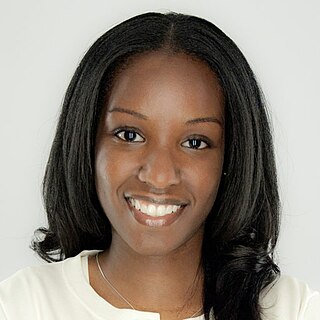
Stacey Finley is the Nichole A. and Thuan Q. Pham Professor and associate professor of chemical engineering and materials science, and quantitative and computational biology at the University of Southern California. Finley has a joint appointment in the department of chemical engineering and materials science, and she is a member of the USC Norris Comprehensive Cancer Center. Finley is also a standing member of the MABS Study Section at NIH. Her research has been supported by grants from the NSF, NIH, and American Cancer Society.
Giuseppe Caire is an Italian telecommunications engineer.
Gerald E. Loeb is an American neurophysiologist, biomedical engineer, academic and author. He is a Professor of Biomedical Engineering, Pharmacy and Neurology at the University of Southern California, the President of Biomed Concepts, and the co-founder of SynTouch.
Steven Shichang Gao is a Chinese electrical engineer.
References
- ↑ "GIANLUCA LAZZI". University of Southern California Dr. Allen and Charlotte Ginsburg Institute for Biomedical Therapeutics.
- ↑ "Gianluca Lazzi, PhD". University of Southern California. Retrieved 6 April 2024.
- 1 2 "Gianluca Lazzi". Interagency Modeling and Analysis Group, National Institute of Biomedical Imaging and Bioengineering. Retrieved 6 April 2024.
- ↑ "Dr. Gianluca Lazzi, Professor, Electrical & Computer Engr". North Carolina State University. Retrieved 6 April 2024.
- ↑ "Engineering in Medicine and Biology Society Awards 2008" (PDF). IEEE Engineering in Medicine and Biology Society. Retrieved 6 April 2024.
- ↑ "IEEE AP-S Fellows 2008". IEEE Antennas and Propagation Society. Retrieved 6 April 2024.
- 1 2 "Viterbi Faculty Directory". University of Southern California Viterbi School of Engineering. Retrieved 6 April 2024.
- ↑ Lazzi, Gianluca (2012). "Editorial: Status of AWPL". IEEE Antennas and Wireless Propagation Letters. Vol. 11.
- ↑ "PROF. GIANLUCA LAZZI ELECTION TO AIMBE'S COLLEGE OF FELLOWS". University of Utah. 23 January 2014. Retrieved 6 April 2024.
- ↑ "GIANLUCA LAZZI, PH.D." American Institute for Medical and Biological Engineering. Retrieved 6 April 2024.
- ↑ "Gianluca Lazzi". University of Southern California Institute for Technology and Medical Systems Innovation. Retrieved 6 April 2024.
- ↑ "GIANLUCA LAZZI, PHD". University of Southern California Keck School of Medicine. Retrieved 6 April 2024.